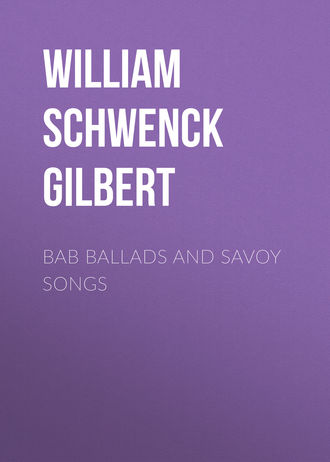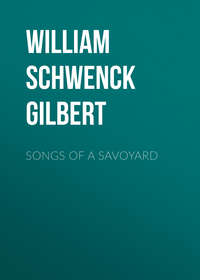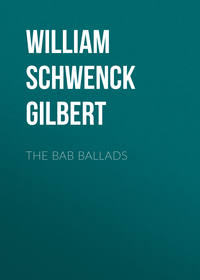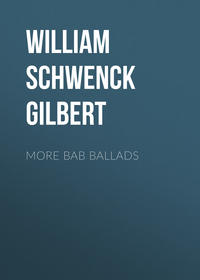Bab Ballads and Savoy Songs
 полная версия
полная версияBab Ballads and Savoy Songs
Жанр: юмористическая литературазарубежный юморзарубежная поэзиязарубежная классиказарубежная старинная литературастихи и поэзияюмор и сатирасерьезное чтениеcтихи, поэзия
Язык: Английский
Год издания: 2018
Добавлена:
Настройки чтения
Размер шрифта
Высота строк
Поля
ONLY ROSES!
To a garden full of posiesCometh one to gather flowers,And he wanders through its bowersToying with the wanton roses,Who, uprising from their beds,Hold on high their shameless headsWith their pretty lips a-pouting,Never doubting—never doubtingThat for Cytherean posiesHe would gather aught but roses!In a nest of weeds and nettles,Lay a violet, half hidden,Hoping that his glance unbiddenYet might fall upon her petals,Though she lived alone, apart,Hope lay nestling at her heart,But, alas! the cruel awakingSet her little heart a-breaking,For he gathered for his posiesOnly roses—only roses!THEY'LL NONE OF 'EM BE MISSED
As some day it may happen that a victim must be found,I've got a little list—I've got a little listOf social offenders who might well be underground,And who never would be missed—who never would be missed!There's the pestilential nuisances who write for autographs—All people who have flabby hands and irritating laughs—All children who are up in dates, and floor you with 'em flat—All persons who in shaking hands, shake hands with you like that—And all third persons who on spoiling tete-a-tetes insist—They'd none of 'em be missed—they'd none of 'em be missed!There's the nigger serenader, and the others of his race,And the piano organist—I've got him on the list!And the people who eat peppermint and puff it in your face,They never would be missed—they never would be missed!Then the idiot who praises, with enthusiastic tone,All centuries but this, and every country but his own;And the lady from the provinces, who dresses like a guy,And who doesn't think she waltzes, but would rather like to try;And that singular anomaly, the lady novelist—I don't think she'd be missed—I'm sure she'd not be missed!And that Nisi Prius nuisance, who just now is rather rife,The Judicial humorist—I've got him on the list!All funny fellows, comic men, and clowns of private life—They'd none of 'em be missed—they'd none of them be missed.And apologetic statesmen of the compromising kind,Such as—What-d'ye-call-him—Thing'em-Bob, and likewise—Never-mind,And 'St—'st—'st—and What's-his-name, and also—You-know-who—(The task of filling up the blanks I'd rather leave to you!)But it really doesn't matter whom you put upon the list,For they'd none of 'em be missed—they'd none of 'em be missed!THE POLICEMAN'S LOT
When a felon's not engaged in his employmentOr maturing his felonious little plans.His capacity for innocent enjoyment,Is just as great as any honest man'sOur feelings we with difficulty smotherWhen constabulary duty's to be done:Ah, take one consideration with another,A policeman's lot is not a happy one!When the enterprising burglar isn't burgling,When the cut-throat isn't occupied in crime,He loves to hear the little brook a-gurgling,And listen to the merry village chime.When the coster's finished jumping on his mother,He loves to lie a-basking in the sun:Ah, take one consideration with another,The policeman's lot is not a happy one!AN APPEAL
Oh, is there not one maiden breastWhich does not feel the moral beautyOf making worldly interestSubordinate to sense of duly?Who would not give up willinglyAll matrimonial ambition,To rescue such a one as IFrom his unfortunate position?Oh, is there not one maiden here,Whose homely face and bad complexionHave caused all hopes to disappearOf ever winning man's affection?To such a one, if such there be,I swear by Heaven's arch above you,If you will cast your eyes on me,—However plain you be—I'll love you!EHEU FUGACES—!
The air is charged with amatory numbers—Soft madrigals, and dreamy lovers' lays.Peace, peace, old heart! Why waken from its slumbersThe aching memory of the old, old days?Time was when Love and I were well acquainted.Time was when we walked ever hand in hand;A saintly youth, with worldly thought untainted,None better-loved than I in all the land!Time was, when maidens of the noblest station,Forsaking even military men,Would gaze upon me, rapt in adoration—Ah, me, I was a fair young curate then!Had I a headache? sighed the maids assembled;Had I a cold? welled forth the silent tear;Did I look pale? then half a parish trembled;And when I coughed all thought the end was near!I, had no care—no jealous doubts hung o'er me—For I was loved beyond all other men.Fled gilded dukes and belted earls before me!Ah, me! I was a pale young curate then!A RECIPE
Take a pair of sparkling eyes,Hidden, ever and anon,In a merciful eclipse—Do not heed their mild surprise—Having passed the Rubicon.Take a pair of rosy lips;Take a figure trimly planned—Such as admiration whets(Be particular in this);Take a tender little hand,Fringed with dainty fingerettes,Press it—in parenthesis;—Take all these, you lucky man—Take and keep them, if you can.Take a pretty little cot—Quite a miniature affair—Hung about with trellised vine,Furnish it upon the spotWith the treasures rich and rareI've endeavored to define.Live to love and love to liveYou will ripen at your ease,Growing on the sunny side—Fate has nothing more to give.You're a dainty man to pleaseIf you are not satisfied.Take my counsel, happy man:Act upon it, if you can!THE FIRST LORD'S SONG
When I was a lad I served a termAs office boy to an Attorney's firm.I cleaned the windows and I swept the floor,And I polished up the handle of the big front door.I polished up that handle so successfulleeThat now I am the Ruler of the Queen's Navee!As office boy I made such a markThat they gave me the post of a junior clerk.I served the writs with a smile so bland,And I copied all the letters in a big round hand.I copied all the letters in a hand so free,That now I am the Ruler of the Queen's Navee!In serving writs I made such a nameThat an articled clerk I soon became;I wore clean collars and a brand-new suitFor the Pass Examination at the Institute.And that Pass Examination did so well for me,That now I am the Ruler of the Queen's Navee!Of legal knowledge I acquired such a gripThat they took me into the partnership.And that junior partnership, I ween,Was the only ship that I ever had seen,But that kind of ship so suited me,That now I am the Ruler of the Queen's Navee!I grew so rich that I was sentBy a pocket borough into Parliament.I always voted at my party's call,And I never thought of thinking for myself at all.I thought so little, they rewarded me,By making me the Ruler of the Queen's Navee!Now, landsmen all, whoever you may be,If you want to rise to the top of the tree,If your soul isn't fettered to an office stool,Be careful to be guided by this golden rule—Stick close to your desks and never go to sea,And you all may be Rulers of the Queen's Navee!WHEN A MERRY MAIDEN MARRIES
When a merry maiden marries,Sorrow goes and pleasure tarries;Every sound becomes a song,All is right and nothing's wrong!From to-day and ever afterLet your tears be tears of laughter—Every sigh that finds a ventBe a sigh of sweet content!When you marry merry maiden,Then the air with love is laden;Every flower is a rose,Every goose becomes a swan,Every kind of trouble goesWhere the last year's snows have gone!Sunlight takes the place of shadeWhen you marry merry maid!When a merry maiden marriesSorrow goes and pleasure tarries;Every sound becomes a song,All is right, and nothing's wrong.Gnawing Care and aching Sorrow,Get ye gone until to-morrow;Jealousies in grim array,Ye are things of yesterday!When you marry merry maiden,Then the air with joy is laden;All the corners of the earthRing with music sweetly played,Worry is melodious mirth.Grief is joy in masquerade;Sullen night is laughing day—All the year is merry May!THE SUICIDE'S GRAVE
On a tree by the river a little tomtitSang "Willow, titwillow, titwillow!"And I said to him, "Dicky-bird, why do you sitSinging 'Willow, titwillow, titwillow?'Is it weakness of intellect, birdie?" I cried,"Or a rather tough worm in your little inside?"With a shake of his poor little head he replied,"Oh, willow, titwillow, titwillow!"He slapped at his chest, as he sat on that bough,Singing "Willow, titwillow, titwillow!"And a cold perspiration bespangled his brow,Oh, willow, titwillow, titwillow!He sobbed and he sighed, and a gurgle he gave,Then he threw himself into the billowy wave,And an echo arose from the suicide's grave—"Oh, willow, titwillow, titwillow!"Now I feel just as sure as I'm sure that my nameIsn't Willow, titwillow, titwillow,That 'twas blighted affection that made him exclaim,"Oh, willow, titwillow, titwillow!"And if you remain callous and obdurate, IShall perish as he did, and you will know why,Though I probably shall not exclaim as I die,"Oh, willow, titwillow, titwillow!"HE AND SHE
HE.I know a youth who loves a little maid—(Hey, but his face is a sight for to see!)Silent is he, for he's modest and afraid—(Hey, but he's timid as a youth can be!)SHE.I know a maid who loves a gallant youth,(Hey, but she sickens as the days go by!)She cannot tell him all the sad, sad truth—(Hey, but I think that little maid will die!)BOTH.Now tell me pray, and tell me true,What in the world should the poor soul do?HE.He cannot eat and he cannot sleep—(Hey, but his face is a sight for to see!)Daily he goes for to wail—for to weep—(Hey, but he's wretched as a youth can be!)SHE.She's very thin and she's very pale—(Hey, but she sickens as the days go by!)Daily she goes for to weep—for to wail—(Hey, but I think that little maid will die!)BOTH.Now tell me pray, and tell me true,What in the world should the poor soul do?SHE.If I were the youth I should offer her my name—(Hey, but her face is a sight for to see!)HE.If I were the maid I should feed his honest flame—(Hey, but he's bashful as a youth can be!)SHE.If I were the youth I should speak to her to-day—(Hey, but she sickens as the days go by!)HE.If I were the maid I should meet the lad half way—(For I really do believe that timid youth will die'!)BOTH.I thank you much for your counsel true;I've learnt what that poor soul ought to do!THE LORD CHANCELLOR'S SONG
The law is the true embodimentOf everything that's excellent.It has no kind of fault or flaw,And I, my lords, embody the Law.The constitutional guardian IOf pretty young Wards in Chancery,All very agreeable girls—and noneAre over the age of twenty-one.A pleasant occupation forA rather susceptible Chancellor!But though the compliment impliedInflates me with legitimate pride,It nevertheless can't be deniedThat it has its inconvenient side.For I'm not so old, and not so plain,And I'm quite prepared to marry again,But there'd be the deuce to pay in the LordsIf I fell in love with one of my Wards:Which rather tries my temper, forI'm such a susceptible Chancellor!And everyone who'd marry a WardMust come to me for my accord:So in my court I sit all day,Giving agreeable girls away,With one for him—and one for he—And one for you—and one for ye—And one for thou—and one for thee—But never, oh never a one for me!Which is exasperating, forA highly susceptible Chancellor!WILLOW WALY!
HE.Prithee, pretty maiden—prithee, tell me true(Hey, but I'm doleful, willow, willow waly!)Have you e'er a lover a-dangling after you?Hey, willow waly O!I fain would discoverIf you have a lover?Hey, willow waly O!SHE.Gentle sir, my heart is frolicsome and free—(Hey but he's doleful, willow, willow waly!)Nobody I care for comes a-courting me—Hey, willow waly O!Nobody I care forComes a-courting—therefore,Hey, willow waly O!HE.Prithee, pretty maiden, will you marry me?(Hey, but I'm hopeful, willow, willow waly!)I may say, at once, I'm a man of properteeHey, willow waly O!Money, I despise it,But many people prize it,Hey, willow waly O!SHE.Gentle sir, although to marry I design—(Hey, but I'm hopeful, willow, willow waly!)As yet I do not know you, and so I must decline.Hey, willow waly O!To other maidens go you—As yet I do not know you,Hey, willow waly O!THE USHER'S CHARGE
Now, Jurymen, hear my advice—All kinds of vulgar prejudiceI pray you set aside:With stern judicial frame of mind,From bias free of every kind,This trial must be tried!Oh, listen to the plaintiff's case:Observe the features of her face—The broken-hearted bride!Condole with her distress of mind:From bias free of every kind,This trial must be tried!And when amid the plaintiff's shrieks,The ruffianly defendant speaks—Upon the other side;What he may say you needn't mind—From bias free of every kind,This trial must be tried!KING GOODHEART
There lived a King, as I've been told,In the wonder-working days of old,When hearts were twice as good as gold,And twenty times as mellow.Good temper triumphed in his face,And in his heart he found a placeFor all the erring human raceAnd every wretched fellow.When he had Rhenish wine to drinkIt made him very sad to thinkThat some, at junket or at jink,Must be content with toddy.He wished all men as rich as he(And he was rich as rich could be),So to the top of every treePromoted everybody.Ambassadors cropped up like hay,Prime Ministers and such as theyGrew like asparagus in May,And Dukes were three a penny.Lord Chancellors were cheap as sprats.And Bishops in their shovel hatsWere plentiful as tabby cats—If possible, too many.On every side Field-Marshals gleamed,Small beer were Lords Lieutenant deemedWith Admirals the ocean teemedAll round his wide dominions;And Party Leaders you might meetIn twos and threes in every streetMaintaining, with no little heat,Their various opinions.That King, although no one deniesHis heart was of abnormal size,Yet he'd have acted otherwiseIf he had been acuter.The end is easily foretold,When every blessed thing you holdIs made of silver, or of gold,You long for simple pewter.When you have nothing else to wearBut cloth of gold and satins rare,For cloth of gold you cease to care—Up goes the price of shoddy.In short, whoever you may be,To this conclusion you'll agree,When every one is somebodee,Then no one's anybody!THE TANGLED SKEIN
Try we life long, we can neverStraighten out life's tangled skein,Why should we, in vain endeavor,Guess and guess and guess again?Life's a pudding full of plums;Care's a canker that benumbs.Wherefore waste our elocutionOn impossible solution?Life's a pleasant institution,Let us take it as it comes!Set aside the dull enigma,We shall guess it all too soon;Failure brings no kind of stigma—Dance we to another tune!String the lyre and fill the cup,Lest on sorrow we should sup.Hop and skip to Fancy's fiddle,Hands across and down the middle—Life's perhaps the only riddleThat we shrink from giving up!GIRL GRADUATES
They intend to send a wireTo the moon;And they'll set the Thames on fireVery soon;Then they learn to make silk pursesWith their rigsFrom the ears of Lady Circe'sPiggy-wigs.And weazels at their slumbersThey'll trepan;To get sunbeams from cucumbersThey've a plan.They've a firmly rooted notionThey can cross the Polar Ocean,And they'll find Perpetual MotionIf they can!These are the phenomenaThat every pretty dominaHopes that we shall seeAt this Universitee!As for fashion, they forswear it,So they say,And the circle—they will square itSome fine day;Then the little pigs they're teachingFor to fly;And the niggers they'll be bleachingBye and bye!Each newly joined aspirantTo the clanMust repudiate the tyrantKnown as Man;They mock at him and flout him,For they do not care about him,And they're "going to do without him"If they can!These are the phenomenaThat every pretty dominaHopes that we shall seeAt this Universitee!THE APE AND THE LADY
A lady fair, of lineage high,Was loved by an Ape, in the days gone by—The Maid was radiant as the sun,The Ape was a most unsightly one—So it would not do—His scheme fell through;For the Maid, when his love took formal shape,Expressed such terrorAt his monstrous error,That he stammered an apology and made his 'scape,The picture of a disconcerted Ape.With a view to rise in the social scale,He shaved his bristles, and he docked his tail,He grew moustachios, and he took his tub,And he paid a guinea to a toilet club.But it would not do,The scheme fell through—For the Maid was Beauty's fairest QueenWith golden tresses,Like a real princess's,While the Ape, despite his razor keen,Was the apiest Ape that ever was seen!He bought white ties, and he bought dress suits,He crammed his feet into bright tight boots,And to start his life on a brand-new plan,He christened himself Darwinian Man!But it would not do.The scheme fell through—For the Maiden fair, whom the monkey craved,Was a radiant Being,With a brain far-seeing—While a Man, however well-behaved,At best is only a monkey shaved!SANS SOUCI
I cannot tell what this love may beThat cometh to all but not to me.It cannot be kind as they'd imply,Or why do these gentle ladies sigh?It cannot be joy and rapture deep,Or why do these gentle ladies weep?It cannot be blissful, as 'tis said,Or why are their eyes so wondrous red?If love is a thorn, they show no witWho foolishly hug and foster it.If love is a weed, how simple theyWho gather and gather it, day by day!If love is a nettle that makes you smart,Why do you wear it next your heart?And if it be neither of these, say I,Why do you sit and sob and sigh?THE BRITISH TAR
A British tar is a soaring soul,As free as a mountain bird,His energetic fist should be ready to resistA dictatorial wordHis nose should pant and his lips should curl,His cheeks should flame and his brow should furl,His bosom should heave and his heart should glow,And his fist be ever ready for a knock-down blow.His eyes should flash with an inborn fire,His brow with scorn be rung;He never should bow down to a domineering frown,Or the tang of a tyrant tongue.His foot should stamp and his throat should growl,His hair should twirl and his face should scowl:His eyes should flash and his breast protrude,And this should be his customary attitude!THE COMING BYE AND BYE
Sad is that woman's lot who, year by year,Sees, one by one, her beauties disappear;As Time, grown weary of her heart-drawn sighs,Impatiently begins to "dim her eyes!"Herself compelled, in life's uncertain gloamings,To wreathe her wrinkled brow with well saved "combings"—Reduced, with rouge, lipsalve, and pearly grey,To "make up" for lost time, as best she may!Silvered is the raven hair,Spreading is the parting straight,Mottled the complexion fair,Halting is the youthful gait.Hollow is the laughter free,Spectacled the limpid eye,Little will be left of me,In the coming bye and bye!Fading is the taper waist—Shapeless grows the shapely limb,And although securely laced,Spreading is the figure trim!Stouter than I used to be,Still more corpulent grow I—There will be too much of meIn the coming bye and bye!THE SORCERER'S SONG
Oh! my name is John Wellington Wells—I'm a dealer in magic and spells,In blessings and curses,And ever filled purses,In prophecies, witches and knells!If you want a proud foe to "make tracks"—If you'd melt a rich uncle in wax—You've but to look inOn our resident Djinn,Number seventy, Simmery Axe.We've a first class assortment of magic;And for raising a posthumous shadeWith effects that are comic or tragic,There's no cheaper house in the trade.Love-philtre—we've quantities of it;And for knowledge if any one burns,We keep an extremely small prophet, a prophetWho brings us unbounded returns:For he can prophesyWith a wink of his eye,Peep with securityInto futurity,Sum up your history,Clear up a mystery,Humor proclivityFor a nativity.With mirrors so magical,Tetrapods tragical,Bogies spectacular,Answers oracular,Facts astronomical,Solemn or comical,And, if you want it, heMakes a reduction on taking a quantity!Oh!If any one anything lacks,He'll find it all ready in stacks,If he'll only look inOn the resident Djinn,Number seventy, Simmery Axe!He can raise you hostsOf ghosts,And that without reflectors;And creepy thingsWith wings,And gaunt and grisly spectres!He can fill you crowdsOf shrouds,And horrify you vastly;He can rack your brainsWith chains,And gibberings grim and ghastly.Then, if you plan it, heChanges organity,With an urbanity,Full of Satanity,Vexes humanityWith an inanityFatal to vanity—Driving your foes to the verge of insanity!Barring tautology,In demonology,'Lectro biology,Mystic nosology,Spirit philology,High class astrology,Such is his knowledge, heIsn't the man to require an apology!Oh!My name is John Wellington Wells,I'm a dealer in magic and spells,In blessings and curses,And ever filled pursesIn prophecies, witches and knells!If any one anything lacks,He'll find it all ready in stacks,If he'll only look inOn the resident Djinn,Number seventy, Simmery Axe!SPECULATION
Comes a train of little ladiesFrom scholastic trammels free,Each a little bit afraid is,Wondering what the world can be!Is it but a world of trouble—Sadness set to song?Is its beauty but a bubbleBound to break ere long?Are its palaces and pleasuresFantasies that fade?And the glories of its treasuresShadow of a shade?Schoolgirls we, eighteen and under,From scholastic trammels free,And we wonder—how we wonder!—What on earth the world can be!THE DUKE OF PLAZA-TORO
In enterprise of martial kind,When there was any fighting,He led his regiment from behind,He found it less exciting.But when away his regiment ran,His place was at the fore, O—That celebrated,Cultivated,UnderratedNobleman,The Duke of Plaza-Toro!In the first and foremost flight, ha, ha!You always found that knight, ha, ha!That celebrated,Cultivated,UnderratedNobleman,The Duke of Plaza-Toro!When, to evade Destruction's hand,To hide they all proceeded,No soldier in that gallant bandHid half as well as he did.He lay concealed throughout the war,And so preserved his gore, O!That unaffected,Undetected,Well connectedWarrior,The Duke of Plaza-Toro!In every doughty deed, ha ha!He always took the lead, ha ha!That unaffected,Undetected,Well connectedWarrior,The Duke of Plaza-Toro!When told that they would all be shotUnless they left the service,The hero hesitated not,So marvellous his nerve is.He sent his resignation in,The first of all his corps, O!That very knowing,Overflowing,Easy-going Paladin,The Duke of Plaza-Toro!To men of grosser clay, ha, ha!He always showed the way, ha, ha!That very knowing,Overflowing,Easy-going Paladin,The Duke of Plaza-Toro!THE REWARD OF MERIT
Dr. Belville was regarded as the Crichton of his age:His tragedies were reckoned much too thoughtful for the stage;His poems held a noble rank, although it's very trueThat, being very proper, they were read by very few.He was a famous Painter, too, and shone upon the "line,"And even Mr. Ruskin came and worshipped at his shrine;But, alas, the school he followed was heroically high—The kind of Art men rave about, but very seldom buy—And everybody said"How can he be repaid—This very great—this very good—this very gifted man?"But nobody could hit upon a practicable plan!He was a great Inventor, and discovered, all alone,A plan for making everybody's fortune but his own;For, in business, an Inventor's little better than a fool,And my highly gifted friend was no exception to the rule.His poems—people read them in the Quarterly Reviews—His pictures—they engraved them in the Illustrated News—His inventions—they, perhaps, might have enriched him by degrees,But all his little income went in Patent Office fees;And everybody said"How can he be repaid—This very great—this very good—this very gifted man?"But nobody could hit upon a practicable plan!At last the point was given up in absolute despair,When a distant cousin died, and he became a millionaire,With a county seat in Parliament, a moor or two of grouse,And a taste for making inconvenient speeches in the House!Then it flashed upon Britannia that the fittest of rewardsWas, to take him from the Commons and to put him in the Lords!And who so fit to sit in it, deny it if you can,As this very great—this very good—this very gifted man?(Though I'm more than half afraidThat it sometimes may be saidThat we never should have revelled in that source of proper pride,However great his merits—if his cousin hadn't died!)WHEN I FIRST PUT THIS UNIFORM ON
When I first put this uniform on,I said as I looked in the glass."It's one to a millionThat any civilianMy figure and form will surpass.Gold lace has a charm for the fair,And I've plenty of that, and to spare,While a lover's professions,When uttered in Hessians,Are eloquent everywhere!A fact that I counted upon,When I first put this uniform on!"I said, when I first put it on,"It is plain to the veriest dunceThat every beautyWill feel it her dutyTo yield to its glamor at once.They will see that I'm freely gold-lacedIn a uniform handsome and chaste—But the peripateticsOf long-haired æsthetics,Are very much more to their taste—Which I never counted uponWhen I first put this uniform on!"





